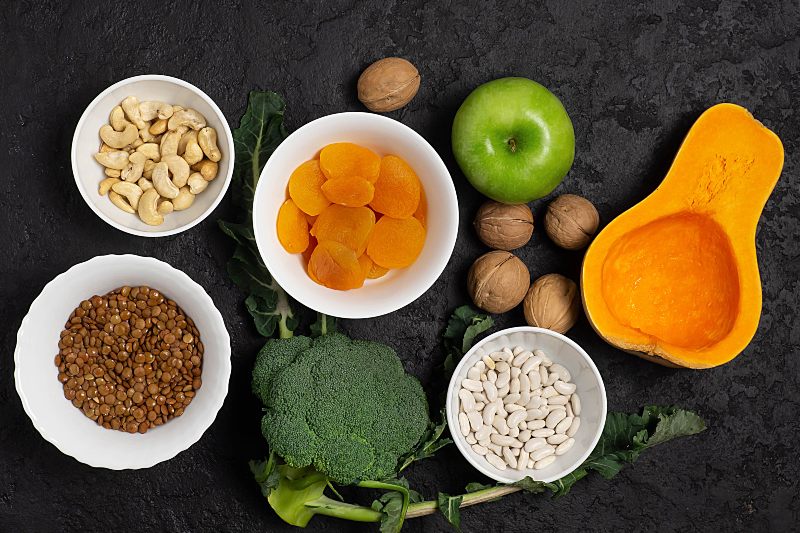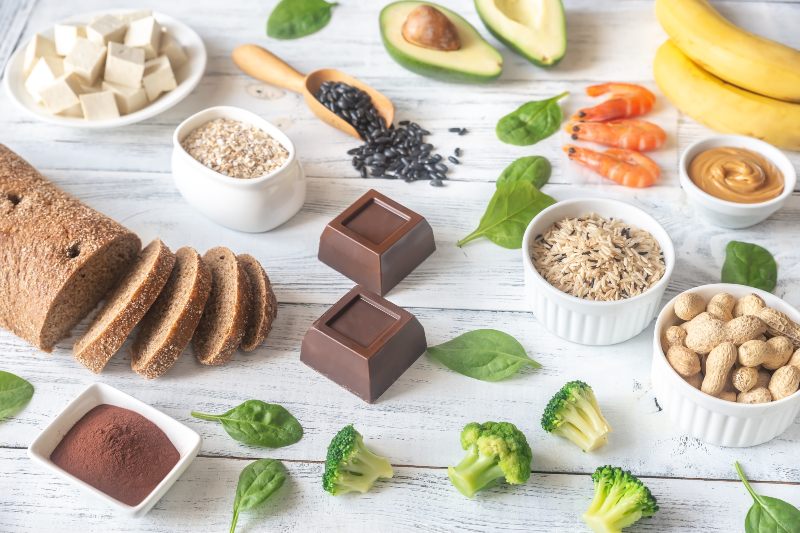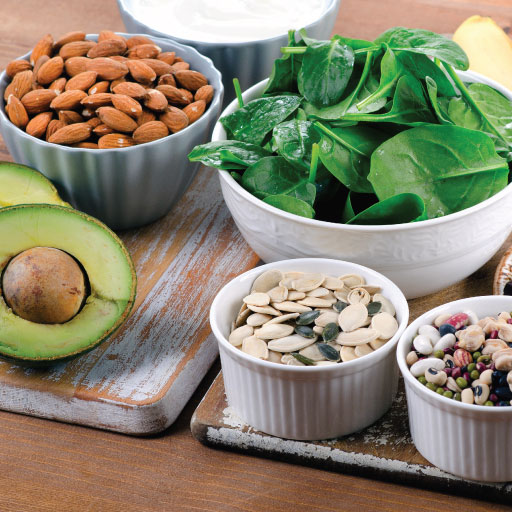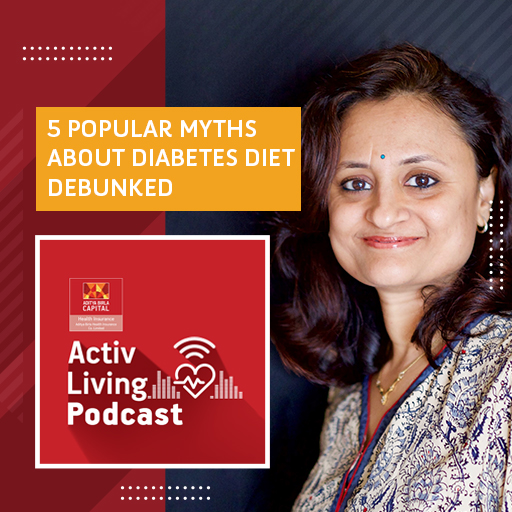Key Takeaways
- Magnesium is a staple mineral required for muscle and nerve function, controlling blood pressure, strengthening bones, and reducing inflammation.
- Its deficiency symptoms include nausea, fatigue, muscle spasms, and abnormal heart rhythms.
- Magnesium-rich foods for diabetes include dark leafy vegetables, healthy seeds, sweet potatoes, almonds, avocados, bananas, dark chocolates, whole grains and tofu.
The human body is complex and needs a combination of proteins, vitamins, minerals and other nutrients to function. Magnesium is one such element required for the stable functioning of the body’s biochemical reactions.
What you need to know:
- What is dietary magnesium?
- Magnesium deficiency symptoms
- Health benefits of magnesium
- Relation between diabetes and magnesium deficiency
- 9 magnesium-rich foods for diabetes
What is dietary magnesium?
In simple terms, dietary magnesium is consumed through foods and beverages. Magnesium is an essential mineral for the body and is crucial in various physiological processes. It is involved in over 300 biochemical reactions, including:
- Energy Production
- Protein Synthesis
- Muscle and Nerve Function
- Heart Health
- Bone Health
- Blood Sugar Regulation
- DNA and RNA Synthesis
- Blood Clotting
Magnesium deficiency symptoms
Here are some common symptoms of magnesium deficiency:
- Nausea and vomiting
- Loss of appetite
- Fatigue and weakness
- Pins and needles
- Hyperexcitability
- Abnormal heart rhythms
- Muscle spasms
- Sleepiness
Health benefits of magnesium
 The benefits of magnesium-rich food are many. Magnesium is required for protein synthesis and muscle and nerve function. It controls blood pressure and glucose levels, which reduces the risk of cardiac arrests. Magnesium also helps strengthen bones and reduces inflammation and pain. It lowers the frequency of migraine attacks. Magnesium is responsible for creating and repairing DNA and RNA in our bodies.
The benefits of magnesium-rich food are many. Magnesium is required for protein synthesis and muscle and nerve function. It controls blood pressure and glucose levels, which reduces the risk of cardiac arrests. Magnesium also helps strengthen bones and reduces inflammation and pain. It lowers the frequency of migraine attacks. Magnesium is responsible for creating and repairing DNA and RNA in our bodies.
Relation between diabetes and magnesium deficiency
People with diabetes, especially those with high blood sugar levels, tend to have a magnesium deficiency. A low level of magnesium is associated with insulin resistance. Insulin helps control the level of glucose (sugar) in the blood. With insulin resistance, glucose cannot enter the cells and builds up in the blood, leading to type 2 diabetes. Magnesium and excess sugar in the urine are cleared out in large amounts. Although this deficiency is more common in type 2 Diabetes, it also occurs in type 1.
9 magnesium-rich foods for diabetes
 The human body requires a minimum of 400 milligrams of magnesium daily. Take a look at 9 magnesium-rich foods for blood sugar control:
The human body requires a minimum of 400 milligrams of magnesium daily. Take a look at 9 magnesium-rich foods for blood sugar control:
Dark leafy vegetables
Consuming dark leafy vegetables high in magnesium, vitamins A, C, and K, and iron, like spinach and cabbage, helps reduce diabetes and magnesium deficiency. Consuming spinach also lowers the risk of cancer.
Healthy seeds
Magnesium-rich foods for diabetes in India, like pumpkin seeds, flaxseeds, chia seeds, and sunflower seeds, can be added to your diet. They help improve the condition of people who are diagnosed with diabetes. A powerhouse of iron, omega-3 fatty acids, and monounsaturated fats, their antioxidant properties protect cells from free radicals, reduce cholesterol, and prevent infections and diseases.
Sweet potatoes
They contain 33 milligrams of magnesium and more fiber than regular potatoes. Here are some ways in which they may benefit your health:
- Improve insulin sensitivity in diabetes
- Maintain healthy blood pressure levels
- Reduce cancer risk
- Improve digestion
- Protect eye health
- Boost immunity
- Reduce inflammation
Almonds
Magnesium-rich foods for diabetes include healthy nuts like almonds, peanuts, and cashews. Almonds’ anti-inflammatory properties lower the risk of heart disease and help with weight management by curbing appetite.
Avocados
One medium avocado provides 58 milligrams of magnesium. They are also high in potassium, vitamin B complex, vitamin K, heart-healthy monounsaturated fat, and fiber. Eating avocados can reduce inflammation, improve cholesterol levels, and increase feelings of fullness after meals.
Bananas
Bananas are well-known for their high potassium content, which can help lower blood pressure and is linked to a reduced chance of heart disease. They are also rich in magnesium, with 37 milligrams of magnesium in one large banana, which boosts stamina. Consuming two large bananas before exercising is advised as magnesium helps move the blood sugar into the muscles and removes lactic acid from the muscles, facilitating repair and regeneration.
Dark chocolates
Don’t feel guilty over binging on dark chocolates as they are not only delicious but healthy. Made with 60-69% cocoa, a 28-gram serving contains 64 milligrams of magnesium, which lowers blood pressure, improves blood flow, helps ease premenstrual syndrome, aids good heart health, and reduces cholesterol. Paired with fresh fruit, dark chocolate makes a decadent and healthy after-dinner dessert.
Whole grains
Whole grains, such as oats, wheat, barley, and pseudo cereals like buckwheat, are widely regarded as magnesium-rich foods for diabetes. Have whole-wheat bread with peanut butter, as they are high in magnesium content.
Tofu
Tofu is a staple food in vegetarian diets due to its high protein content. A 100-gram serving contains 35 milligrams of magnesium. One serving also provides 10 grams of protein, calcium, iron, manganese, and selenium. Additionally, some studies suggest that eating tofu and other soy products can protect the cells lining your arteries and may be associated with a decreased chance of stomach cancer.
The bottom line is that magnesium can be useful and healthy if added to our regular diet.
Stay tuned to the Activ Living Community. Keep up to date with the latest health tips and trends through expert videos, podcasts, articles, and much more on nutrition, fitness, mindfulness, and lifestyle conditions like Asthma, Blood Pressure, Cholesterol, and Diabetes. Activ Living ke saath sahi sehat ki shuruat ABHI karo.
You may also be interested in the following blogs:
Popular Searches
How to lower blood pressure | Fruits good for liver | Unhealthy foods | Ragi Benefits | Basal Metabolic Rate | Acupressure points for High Blood Pressure | Ayurvedic medicine for blood pressure | How to control cholesterol at home | Homeopathy for Asthma | Biological Age | Home remedies for TB | Natural beta blockers | Negative effects of internet | Types of walking | Blood pressure calculator | Blood sugar calculator | BMI Calculator





 1800-270-7000
1800-270-7000











